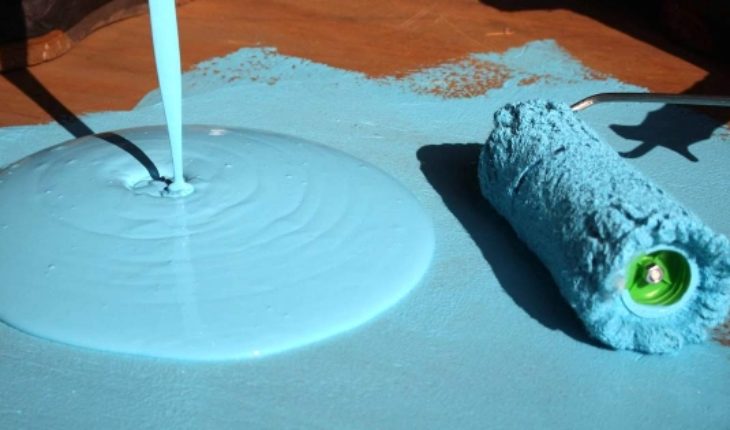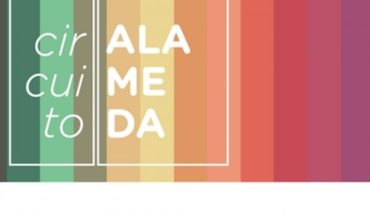A year ago The Mostrador spoke to the authors of a rupturist initiative: to recycle plumavit to transform it into paint. At nearly two years old, the team has already recycled nearly 10 tons of expanded polystyrene.
However, despite being a poorly explored niche, Cristina and Constanza – the founders – must go through a series of potholes: from little citizen initiative to try alternative options to tax inequity.
But first let’s contextualize. The idea was born under the eaves of the chemical professionals who created in 2014 the company Idea-Tec. But it wasn’t until three years later that they got into the production of paint from plumavit. Since its founding, Idea-Tec has joined seven other collaborators, with nine in total.
The team collects the plumavit mainly from two sources: through the companies that contact them and in a monthly fair organized by the municipality of Vitacura, where the neighbors will leave them the material. They initially converted the collected plumavit into road and floor demarcation paint. But they have been forced to venture into common areas, such as home painting.
What obstacles do you face when expanding Idea-Tec’s capacity?
Today our bottleneck is related to how much paint we sell. Plumavit there’s a lot. We have calculated that in kilos more than 18 thousand tons of plumavit residues are generated per year. So the need to leave the material somewhere is. We sometimes have a waiting list to receive the material.
Today the most important thing is just the sale of paint because that is like a vacuum cleaner: if we manage to sell a lot of paint, all the rest flows, because you grow as a company, you have more flow, you have more money to be able to grow more, make the wheel walk much more quickly.”
Selling challenges
Tying Cabos, a sustainable initiative of Comberplast, recycles plastic waste from the fishing industry. One of its main challenges is to close the cycle of the circular economy, that is, to integrate products made of recycled material into the market. There they converge Atando Cabos and Idea-Tec: the difficulty of sale.
“On the one hand there is awareness of what it means to recycle, because there are many people who get to leave their penvit, to the fair for example, and are happy to deliver the plumavit. That person feels like he’s recycling, but you’re not really recycling yet, you just started the first part of recycling, which is delivering the material. But for that to be recycled it has to go through the whole cycle of transformation, sale and introduction, in our case, painting”, explains Cristina Acuña.
The co-founder of Idea-Tec also points to the superficial sustainable policy of some companies. “Shopping areas still have the priority of listing at the lowest price, and suddenly they don’t wonder if maybe a sustainable product has the same price. They don’t even get it quoted. There is also a theme with the fluidity with which companies transmit their sustainability policies to all parties that execute the purchase, that execute the painting, whatever it is,” he says.
What role do public policies play in supporting these types of sustainable initiatives?
I see that all of a sudden there are policies related to recycling, but they are policies that push, that force you to do something. For example, if products like those of Atando Cabos, like ours, if there was for example a tax cut, I could probably be more competitive against larger companies. They, as they have economies of scale, can sell at lower prices. Not me. If we had some kind of tax rebates, I could be much more competitive, because it could have lower prices.
At the public policy level, sustainable products could be given a plus, with an additional score. Suppose you’re going to bid for the painting of a commune’s buildings. If you score additionally to make the paint sustainable, you’re also encouraging the use of a painting like ours instead of one that doesn’t allow recycling.
Municipalities and recycling
Apart from attending the Vitacura fair have you thought about collaborating with other municipalities of Santiago?
With the municipality of Santiago we are making an agreement but it is a very preliminary thing. They also have the means to manage the material. They take the material to our plant, unlike other municipalities that often with their management systems can not leave us the material, but if or if they do with a company that can go to look for the material and take them.
Since we’re very young, we can’t do that. The intention is, but as long as people and the municipalities themselves don’t fall because if they don’t use paint, it’s hard for me. If the municipality said, we’re going to paint everything with this, it would be super different.
How have you seen the public’s efforts to drive initiatives like Those of Idea-Tec?
There’s a lot of desire to recycle, to do new things, to do different things, to do things with added value. Many recyclings do, grab the material and use it again for the same thing. So if I had plastic bottles, I grab that plastic and make plastic bottles again. That’s unsustainable economically speaking. There are people who have tried to create things that are different, who take off from this reuse to do the same thing again. They do things that have added value. This added value if it allows you to form a sustainable and sustainable company economicly, environmentally, socially in all aspects.





